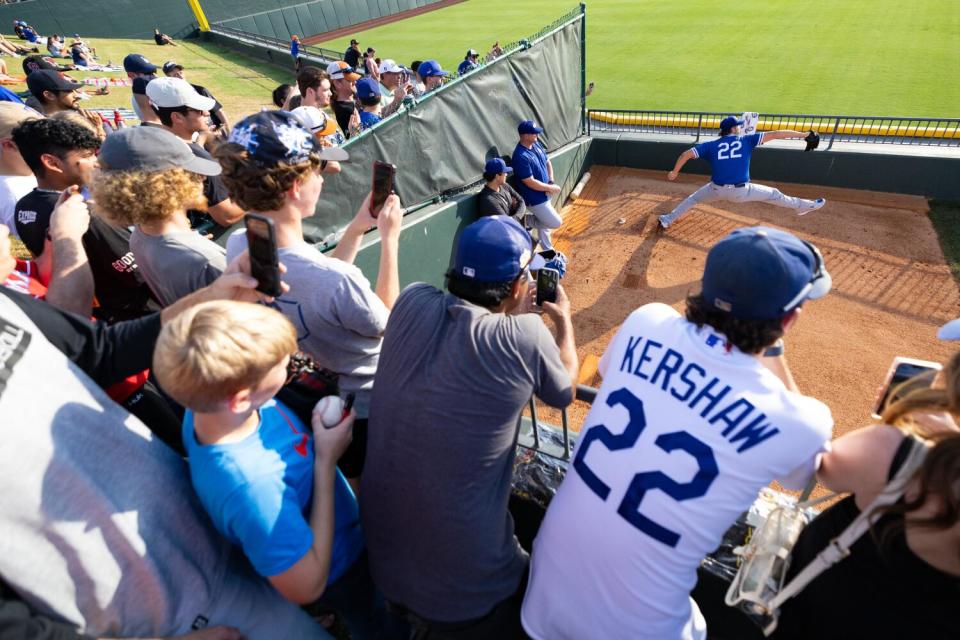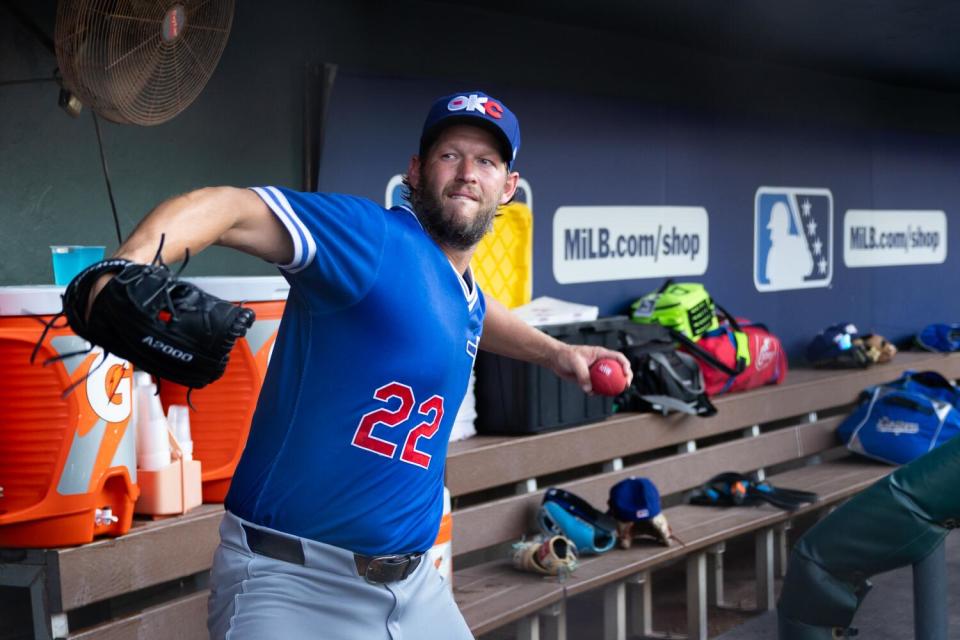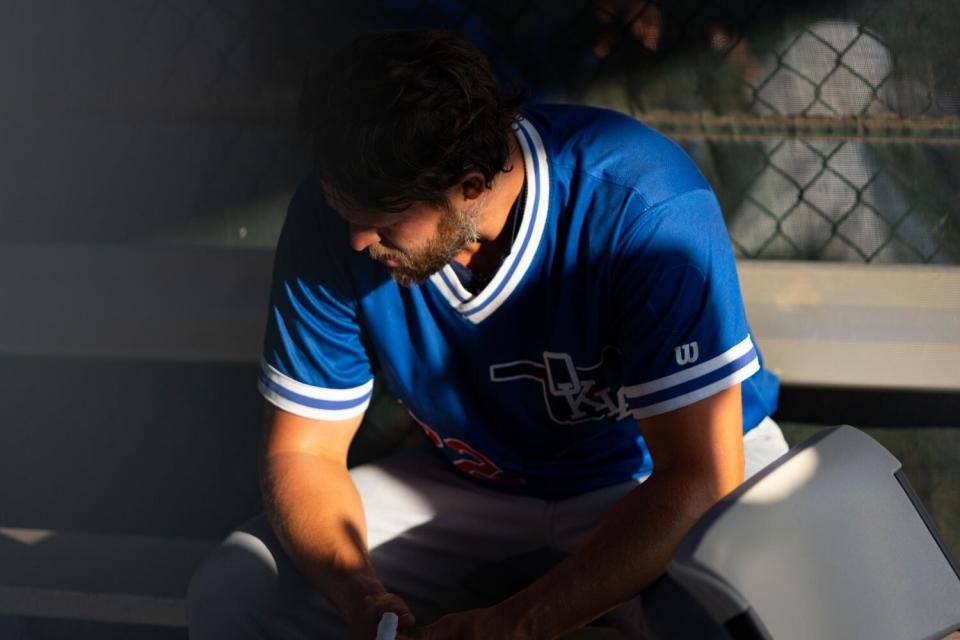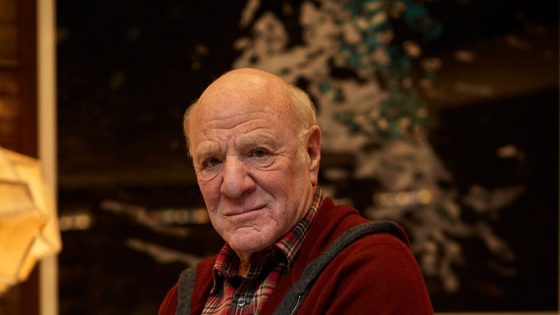They wore L.A. hats and No. 22 T-shirts, an army of Dodgers-clad, Kershaw-hungry spectators soaking up a view they’d waited for all summer.
About a quarter to seven last Friday night, roughly 30 minutes before a triple-A game with the Dodgers’ Oklahoma City affiliate, Clayton Kershaw walked through the long outfield shadows at Dell Diamond stadium, beginning his standard pregame routine on an evening that was anything but.
Around him, hundreds of Dodgers fans had flocked to the minor league ballpark, shouting Kershaw’s name and showering him with applause throughout a regimented series of stretches, warm-up throws and bullpen tosses.
For much of this year, such sights had been rare, with Kershaw sidelined by an offseason shoulder surgery and stuck in a tedious slog of a nine-month rehabilitation program.
Read more: Clayton Kershaw nearing his Dodgers return: ‘If they need me now, I’ll be ready’
But this promised to be the last step of that process; a final triple-A outing before his long-awaited return to the Dodgers’ big league club.
As Kershaw concluded his pregame work, shyly waving to the crowd before flipping a ball to a young fan, he was met with a reception that reflected the stature he has earned in the Dodgers organization.
He might not be the preeminent star pitcher he was once, well past his days of winning MVP and Cy Young Awards. But, to the franchise he has called home for almost 20 years, the future Hall of Famer is still a very big deal.
On Thursday, with his recovery from last November’s surgery finally complete, Kershaw will rejoin the Dodgers and return to the Chavez Ravine mound, set to make his season debut for a team that missed him more than it could have ever imagined.


“I never expected just to try to come back to not help or contribute,” Kershaw said. “I wanted to come back and be part of something special, and contribute … be one of the best five guys that we have.”
When Kershaw first re-signed with the club in February, after deciding to bypass retirement for at least another year, the odds of him being one of the Dodgers’ best pitchers seemed slim.
For multiple reasons, his role on the 2024 club was largely unclear.
His surgery, to repair the capsule and glenohumeral ligaments in a left shoulder that dogged him last year, made his return this year no guarantee in the first place. And it seemed as if even if the 36-year-old did come back, the Dodgers had already found other ways to address their pitching needs.
It all made Kershaw something of a bonus piece in their big-picture plans; someone who could give them depth and stability upon completing his rehab but wasn’t exactly crucial to their World Series dreams.
“We feel good that he will come and contribute and be a big part of what we do,” president of baseball operations Andrew Friedman said at the start of spring training. “The ‘when,’ we’re not sure yet.”
Fast-forward a few months, and Kershaw’s return couldn’t be coming at a better time for the Dodgers.
The team is currently without Yoshinobu Yamamoto, Bobby Miller and Walker Buehler, all of whom have battled injuries this season. Tyler Glasnow and Gavin Stone are both approaching career-high workloads, meaning their usage will be monitored over the rest of the season. Most of all, the starting rotation has been scuffling for much of the last month, raising questions about the Dodgers’ ability to not only get through the rest of the regular season but field an October-caliber stable of arms to navigate the playoffs once they get there.
“Obviously, having Clayton come back, it was going to be additive,” manager Dave Roberts said.
But now there “is certainly a place of need,” Roberts added.
Not only for the left-hander to come back and pitch — but also pitch well for a club seeking postseason options.
“That’s always been my mindset, regardless of what’s going on,” Kershaw said. “But obviously right now, we’re in a little bit of dire straits. We need to hold on a little bit.”
Exactly what the Dodgers will get from Kershaw remains the biggest question ahead of his Thursday return.
Read more: Yoshinobu Yamamoto no longer feeling pain, but his return timeline is unclear
For the first four months of the season, the 17-year veteran has been in rehab mode, tormented by the grind of the first surgical recovery of his playing career.
“I don’t want to say it’s been miserable, because I’ve gotten to have a lot more family time and be able to hang out with them more,” said Kershaw, who has traveled back to his home in Texas every time the Dodgers have been on the road. “But I mean, yeah. You don’t feel like you’re doing what you’re supposed to be doing. … I get it now. Rehab’s not fun.”
Having never undergone surgery before, Kershaw admitted he “didn’t really believe people, honestly, when they said it’s an up-and-down thing, and you’re gonna have good days and bad days.”
That unpredictability, it turned out, grated on Kershaw’s patience.


He had a setback last month when lingering soreness in his shoulder forced him to postpone his second minor league rehab start. And, as he started to see the finish line over the last few weeks, the final steps of recovery felt like some of the hardest to the 10-time All-Star.
“Getting closer and kind of tasting being able to be back out there,” Kershaw said earlier this month, “each day is starting to be a little bit more tedious.”
Despite that, Dodgers staff have seen encouraging signs at each step of Kershaw’s progression.
Throughout his throwing program, Kershaw wowed coaches with his fluid mechanics, releasing pitches “free and easy,” as pitching coach Mark Prior described it, without any hitches or post-surgical delivery flaws.
“Most guys coming off of any surgery, there’s hesitation in the delivery … or things to the naked eye that just don’t look right,” Prior said. “But with him, it’s crazy how consistent his delivery has been. The first time you saw him throw, you were like, ‘This is almost identical to where he was before.’ That’s been good to see.”
Kershaw’s stuff has also improved from last season, when he could rarely eclipse 90 mph with his shoulder limitations.
In his rehab start last Friday, Kershaw touched nearly 92 mph with his four-seamer. His trademark slider and curveball continued to play off the pitch effectively, leading to 12 total strikeouts in his three minor league outings. Kershaw has also tinkered with some new weapons, testing out a sinker and split-changeup occasionally during his rehab process.
“He’s one of those guys that seems to try to be one step ahead of the hitters,” Prior said. “He’s much more open probably than he was four or five years ago to having to adjust his arsenal, his usages.”
Questions about Kershaw’s capabilities still abound.
He didn’t throw more than four innings in any of his rehab starts. At the end of Friday’s appearance, his fastball was down around 87-88 mph. And, for as sound as he has looked during his recovery, he still faces the variables that follow any major surgery.


“I’ve got to kind of do what I do,” he said of his forthcoming return, “and see if it works or not.”
But the Dodgers are hopeful — if not, desperate — that it will, clinging to the belief that Kershaw still has plenty left in his seemingly unending tank.
Read more: Plaschke: Trade deadline feels like panic time for Dodgers
Before Kershaw’s one-out, six-run debacle in the playoffs last year, he managed a 13-5 record and 2.46 ERA in the regular season, finding ways to remain one of the Dodgers’ most productive pitchers even in his diminished physical state.
And this year, while he no longer might be anywhere near an ace, Kershaw will be asked to help stabilize a fluctuating rotation — one that could need him to pitch more important innings in playoff games.
“Talking to Clayton about how much better he feels,” Roberts said, “I just don’t see why there wouldn’t be an uptick in stuff.”
Added Prior: “This is where we get into Clayton [being an] outlier type of thing. You just don’t underestimate what he’ll do.”
Sign up for more Dodgers news with Dodgers Dugout. Delivered at the start of each series.
This story originally appeared in Los Angeles Times.
Source Agencies

